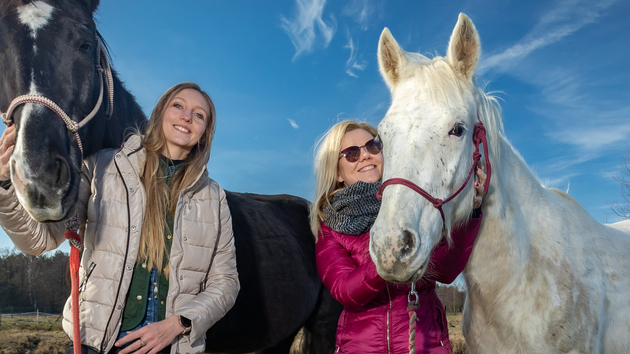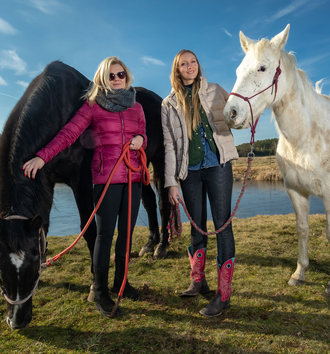As part of a project funded by the University of Lodz Student Research Grants, you studied how the presence of horses affects human attention and heart rhythm. What have you managed to establish?
I compared people who work with horses on an everyday basis with people who do not deal with these animals. In the case of the first group, the collected data has shown that these study subjects scored better on tests of attention and perceptiveness. It turns out that contact with a horse teaches attentiveness and quick reactions to emerging stimuli. Horses are masters of non-verbal communication and constantly want to communicate with us. The signals they send are often subtle and not always visible. As far as the physiological aspects are concerned, I have chosen to study Heart Rate Variability, HRV. It reflects tension that occurs in the human autonomic system. I have chosen this indicator because it relates to short-term heart rate variability and conclusions about the state of the body can be drawn based on it.
Why did you become interested in this particular therapy method?
My adventure with horses started when I was a child and it has continued until now. These animals have taught me, above all, patience, confidence and the aforementioned attentiveness. To understand the uniqueness of the relationship between a man and a horse, first one must get to know the species better. Horses are primarily fleeing and herd animals that look for a leader when they interact, both among other members of the herd and among humans. They are also excellent at reading our emotions and non-verbal speech and they can sense our heartbeat, which tells us about our attitude and mood.
I understand that these abilities help them establish non-verbal communication with people. In such a case, how different is the relationship with them from the human bond with pets, such as dogs and cats?
What distinguishes horses from other animals, especially those domestic ones, is a strong instinct that they have not lost even after many years of working with humans. Horses take care of their needs first and foremost. They constantly check if they can relax with us and follow us, entrusting us with their lives because they see us as confident leaders. They communicate all the time and look for signals to adjust best and guess what we want from them and then, in partnership, achieve the goal. A state of calm and relaxation is also very important for horses. They strive for it all the time, and thanks to that through our interaction with them we learn it too.
Well, exactly. In culture, a horse is associated with tranquillity and a kind of majesty, but also with courage and heroism.
The symbolism and image of a horse inspire awe, a sense of beauty and mystery in people. Although these animals are very delicate and subtle, we feel the courage emanating from them, which fills us with strength. And I consider all of this to be at the heart and uniqueness of the human – horse relationship. There are more and more studies that provide evidence of the positive influence of horses on humans, but there are still many areas to be explored.
For years, there has been more and more talk about hippotherapy, a therapy based on building a relationship between a man and a horse. What are its general principles?
Hippotherapy aims at restoring and improving human health and fitness. It is intended for people with psychomotor problems or mental retardation. With the development of hippotherapy, due to its positive effects and demand for it, different forms of such support have been identified. The first is physiotherapy – this is a type of gymnastics performed on a horse in order to restore physical fitness. The second is psycho-pedagogical riding – a set of activities aimed at cognitive, intellectual, emotional and physical improvement. What I do in the context of my research is a therapy, which consists in allowing a patient to get to know and interact with the animal. The effect to be produced by the therapeutic process is to improve this person's communication with the outside world.
As part of the Doctoral Research Grant competition, you focus on how HAE therapy affects oxytocin levels in the human body. What does this model consist in?
The Horse Assisted Education (HAE) method assumes that a man learns in the company of horses and develops social skills such as communication, motivation, leadership, goal setting, relationship building and working with emotions. HAE has been known and appreciated worldwide for almost 30 years, with programmes addressed to companies and individuals. The method is also used in working with people with mental health problems, including post-traumatic stress disorder (PTSD). HAE is based on experience and observation of a human – horse interaction, it is also supported by psychological knowledge and the basis of theoretical models is available in scientific papers.
How does this method work?
It's a simple interaction that involves performing tasks with an animal. Importantly, there are no elements of horse riding involved. Doing an exercise is often the beginning of deeper work that is based on experience, followed by a discussion and analysis. Here we work with symbols, associations and emotions that we feel at a particular moment. I have been an HAE facilitator (a person whose job it is to actively participate in making the communication process smoother - ed.) since 2015. In development workshops, many times I have seen how horses trigger reflective thinking and expand self-awareness in people. Often one meeting is only the beginning of the work on oneself, but the experience is profound enough to be memorable for a long time, and the process itself takes months. So far, when working using the HAE method, I have focused on the impact of horses on the cognitive processes and well-being of healthy people. This time I want to see how a person suffering from recurrent depressive disorder would react to contact with a horse.
In your research, in addition to psychological indicators, you also analyse biological ones.
Yes, I do. I have decided to use questionnaires on personality, emotional intelligence and depression scales. Taking into account the biological indicator, I have chosen to test oxytocin levels, as this hormone is responsible, among other things, for building relationships and forming bonds. Moreover, people with depression often have low results of this neuropeptide. Literature indicates that contact with animals (so far mainly domestic ones) increases oxytocin and therefore, improves relationships with others.
Both projects – carried out as part of Student and Doctoral Research Grants – are part of wider research that you are carrying out as part of your doctoral dissertation. What is their purpose?
Together with my doctoral thesis supervisor, prof. dr hab. n. zdr. Monika Talarowska, we would like to explore psychological and biological background of hippotherapy dedicated to people suffering from depression. It is a disease that is increasingly prevalent in people of all ages, and its effects affect the quality of social life. The objective of our study is to see if periodic encounters with horses affect oxytocin levels in the human body. In addition, we will analyse the relationship of the study subject's personality, emotional intelligence and degree of depression with the effectiveness of hippotherapy. It is hoped that the results will serve as a basis for considering whether incorporating horses into traditional psychotherapy and pharmacotherapy will have positive benefits. It is hoped that this new treatment option will contribute to the increase in the effectiveness of treatment and the speed of improvement in well-being and health.
UL IDUB grants
The Excellence Initiative – Research University – grant competitions as part of which the University of Lodz funds research ideas of its scientists and doctoral students. By supporting them in conducting high quality research, the University implements a strategy of striving for research excellence in all fields and disciplines. The competitions also serve the purpose of internationalisation – developing and strengthening the University's cooperation with international researchers. As part of grants addressed to scientists from outside the University, experienced and young researchers join the team of the University of Lodz. This favours the fusion of experiences and increasing the University's scientific potential, supports networking and employee mobility.
The grants are financed as part of the subsidy increased by 2% for universities that joined the IDUB competition in 2019. University of Lodz will receive additional funding for research until 2026. Internal grant competitions have been implemented since 2020.
Currently, in the 2nd edition, over PLN 3 million was used to finance young, experienced researchers and doctoral students in such grant competitions as: UL IDUB "Grants for young and experienced researchers" and "Doctoral research grants".
Source: Kinga Rucka, University of Lodz Doctoral School of Social Sciences;
Edit: Mateusz Grabowski, Service Centre for Students and PhD Candidates, University of Lodz


